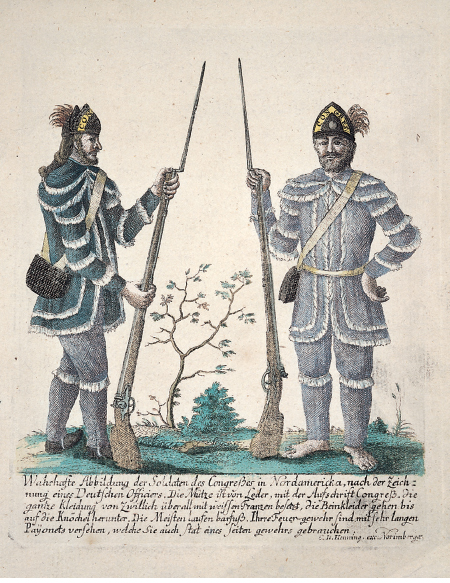The Perils of War

The Patriots’ triumph at Saratoga was tempered by wartime difficulties. A British naval blockade cut off supplies of European manufactures and disrupted the New England fishing industry; meanwhile, the British occupation of Boston, New York, and Philadelphia reduced trade. As Patriots, along with unemployed artisans and laborers, moved to the countryside, New York City’s population declined from 21,000 to 10,000. The British blockade cut tobacco exports in the Chesapeake, so planters grew grain to sell to the contending armies. All across the land, farmers and artisans adapted to a war economy.
With goods now scarce, governments requisitioned military supplies directly from the people. In 1776, Connecticut officials asked the citizens of Hartford to provide 1,000 coats and 1,600 shirts, and soldiers echoed their pleas. After losing all his shirts “except the one on my back” in the Battle of Long Island, Captain Edward Rogers told his wife that “the making of Cloath … must go on.” Patriot women responded; in Elizabeth, New Jersey, they promised “upwards of 100,000 yards of linnen and woolen cloth.” Other women assumed the burdens of farmwork while their men were away at war and acquired a taste for decision making. “We have sow’d our oats as you desired,” Sarah Cobb Paine wrote to her absent husband. “Had I been master I should have planted it to Corn.” Their self-esteem boosted by wartime activities, some women expected greater legal rights in the new republican society.
Still, goods remained scarce and pricey. Hard-pressed consumers assailed shopkeepers as “enemies, extortioners, and monopolizers” and called for government regulation. But when the New England states imposed price ceilings in 1777, many farmers and artisans refused to sell their goods. Ultimately, a government official admitted, consumers had to pay the higher market prices “or submit to starving.”
The fighting endangered tens of thousands of civilians. A British officer, Lord Rawdon, favored giving “free liberty to the soldiers to ravage [the country] at will, that these infatuated creatures may feel what a calamity war is.” As British and American armies marched back and forth across New Jersey, they forced Patriot and Loyalist families to flee their homes to escape arrest — or worse. Soldiers and partisans looted farms, and disorderly troops harassed and raped women and girls. “An army, even a friendly one, are a dreadful scourge to any people,” wrote one Connecticut soldier. “You cannot imagine what devastation and distress mark their steps.”
The war divided many farm communities. Patriots formed committees of safety to collect taxes and seized the property of those who refused to pay. “Every Body submitted to our Sovereign Lord the Mob,” lamented a Loyalist preacher. In parts of Maryland, the number of “nonassociators” — those who refused to join either side — was so large that they successfully defied Patriot mobs. “Stand off you dammed rebel sons of bitches,” shouted Robert Davis of Anne Arundel County, “I will shoot you if you come any nearer.”